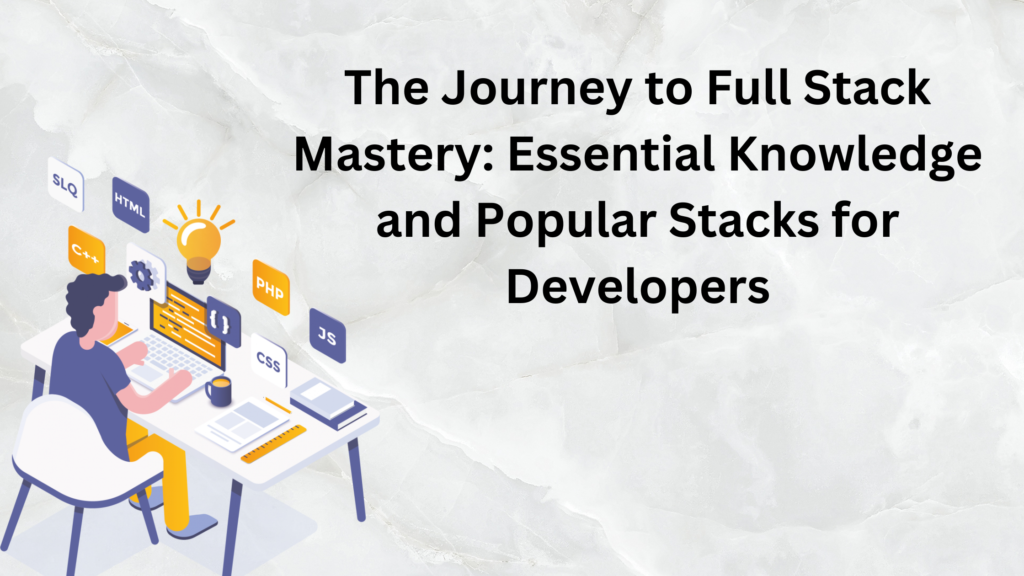Becoming a Full Stack Developer: Essential Knowledge and Popular Stacks

To embark on a successful journey as a full-stack developer, it’s crucial to have a comprehensive understanding of various technologies and concepts. A full-stack developer is responsible for both back-end and front-end development, version control systems, APIs, servers, applications, security best practices, data structures and algorithms, and user interface (UI) design. Additionally, proficiency in soft skills, project management, and DevOps is highly advantageous. Let’s explore some popular technology stacks in detail.
- MEAN Stack: The MEAN stack comprises the following components:
- Front-end framework: JavaScript and AngularJS
- Database: MongoDB
- Web framework: Node.js
- Back-end web framework: Express.js
- LAMP Stack: The LAMP stack encompasses the following elements:
- Operating System: Linux
- Web Server: Apache
- Front-end framework: JavaScript
- Database: MySQL
- Programming and Development: PHP
- MERN Stack: Similar to the MEAN stack, the MERN stack is based on JavaScript technologies. Its main components are:
- Database: MongoDB
- Web Programming Framework: Express
- Building UI: Node.js and React
These stacks serve as popular choices for full stack developers and are widely used in the industry. However, it’s important to note that technology stacks may vary depending on project requirements and personal preferences. Therefore, it’s essential to stay updated with emerging technologies and trends.
As you embark on your journey to become a full stack developer, continuously expanding your knowledge, honing your technical skills, and staying adaptable to industry advancements are key. Strive to master the required technologies, but also focus on improving soft skills such as communication, problem-solving, and teamwork. Additionally, being well-versed in project management methodologies and DevOps practices will enable you to deliver high-quality, efficient solutions.
Essential Skills for Full Stack Developers: A Versatile Tech Toolbox
Becoming a successful full-stack developer requires a diverse skill set spanning various frameworks, programming languages, and databases. Let’s explore the essential skills needed for front-end and back-end development, as well as other crucial areas.
- Front-End Development: To excel in front-end development, a full stack developer should possess industry-ready skills in:
- HTML: Understanding the structure and semantics of web pages.
- CSS: Proficiency in styling and layout techniques.
- JavaScript: Mastery of the programming language for interactive web elements.
- jQuery: Knowledge of this popular JavaScript library for simplifying client-side scripting.
- Angular: Familiarity with this powerful front-end framework for building robust web applications.
- ReactJS: Proficiency in this JavaScript library for building reusable UI components.
- Back-End Development: Full stack developers should have a solid grip on various programming languages for back-end development, including:
- PHP: Proficiency in this widely-used language for web development.
- Java: Strong Java skills are essential due to their popularity in enterprise-level applications.
- Python: Knowledge of Python, a versatile language for web development, data analysis, and automation.
- Node.js: Understanding of this JavaScript runtime for building scalable and high-performance network applications.
- Ruby: Familiarity with Ruby programming for web development using frameworks like Ruby on Rails.
- Databases: A full-stack developer should be well-versed in working with databases. Key database skills include:
- MySQL: Knowledge of this popular relational database management system.
- MongoDB: Proficiency in this NoSQL document database for flexible data storage.
- Oracle Database: Understanding the concepts and functionalities of Oracle’s robust database system.
- SQL Server: Familiarity with Microsoft’s relational database management system.
- DevOps and Version Control: Full stack developers should have practical skills in DevOps and version control, including:
- CI/CD: Knowledge of continuous integration and continuous delivery practices to streamline software development processes.
- GitLab and Jenkins: Understanding these popular tools for version control, automated testing, and continuous integration.
- Soft Skills: In addition to technical expertise, full stack developers benefit from honing their soft skills, such as:
- Communication: Excellent verbal and written communication skills to collaborate effectively with team members and stakeholders.
- Time Management: Efficiently managing tasks and deadlines to ensure timely delivery of projects.
- Curiosity and Creativity: A mindset of continuous learning, exploring new technologies, and finding innovative solutions.
Additional Skills for Mobile App Development: For full-stack developers interested in mobile app development:
- React Native: Skills in this framework for building cross-platform mobile applications.
Additional Skills for Native App Development: For full-stack developers venturing into native app development:
- Kotlin: Proficiency in this modern programming language for Android app development.
- Swift: Understanding of Swift, Apple’s programming language for iOS app development.
Remember, the tech landscape is ever-evolving, so continuous learning and staying up-to-date with emerging technologies will be crucial for your success as a full-stack developer. Embrace the challenge, continuously expand your skills, and keep pushing the boundaries of your expertise.

Leave a Reply